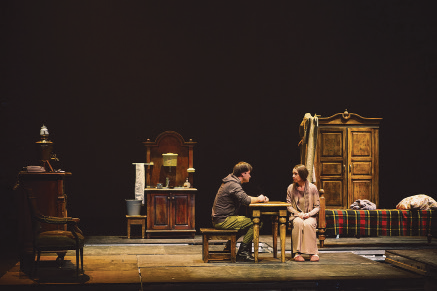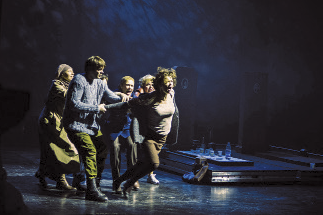Minsk hosts major international Teart forum — with two performances staged on the works by young Belarusian playwright Dmitry Bogoslavsky

Dmitry Bogoslavsky
Dmitry, you are an actor with the Belarusian State Youth Theatre. What inspired you to begin writing plays?
In 2009, the theatre closed for repair, so I had more free time. I wanted to create and had lots of energy. I’d written poetry in childhood; about love, of course. Later, I focused on novellas and, since employment at the theatre, had begun writing plays.
Where have they been staged?
In Moscow, Kiev, Warsaw and elsewhere. There have been around two dozen stagings — even in Mongolia — but mostly in Russia, as local directors follow modern dramaturgy.
What is your recipe for success?
I’ve never thought about it but, since 2009, I’ve been sending my plays to contests and festivals. They probably became tired of me [laughing]. The jury must have decided to acknowledge that I’m not a bad playwright so that I’ll then stay in Minsk!
Why do Belarusian audiences know so little of your plays?
It may be because directors mistrust my age. I was 25 when my ‘Love of People’ was staged and some directors questioned whether I had really written the play. I had to apologize, saying that nothing could be done [about my age]. Happily, the situation is now changing.

Scene from the performance Father, based on Dmitry Bogoslavsky’s play
Your plays are sometimes called tough. Why?
Life is, sadly, tough and, regretfully, we’ve become used to this.
Do you always agree with a director’s interpretation of your play?
I have no right to disagree. My work is complete after the last dot is placed. I might have written a play on death but a director may see it as a play about life. Let this happen, as this is their view. However, I’m definitely pleased when my opinion is taken into consideration. I spend hours talking by Skype with some directors.
What do you dislike in the theatre?
I don’t enjoy farce or lavatorial humour. I also dislike lack of taste.
What are modern dramaturgy trends?
We shouldn’t distinguish between ‘old’ and ‘new’ since the themes tackled by theatre always have relevance, whether written a century ago or five centuries ago, or recently. Theatre speaks of people’s lives and social problems, although the topicality of various aspects differs across time. Today’s Russian plays often focus on politics while Ukrainian playwrights turn to events in Maidan. Playwrights wish to explore commonly known issues so documentary theatre is popular but it would be great if playwrights preserved events rather than their opinions.
Who are your favourite playwrights?
I love Maeterlinck, as his plays combine all the aspects in which I’m interested: including a mystic atmosphere. I’d like to write as well as he does [laughing]. However, my time has not yet come. I lack sufficient skill.

Scene from the performance Father, based on Dmitry Bogoslavsky’s play
I’ve heard you like writing your plays on your balcony. Is this true?
This will never change. Of course, I might be in a hurry on the street when a phrase or an idea comes to mind. In this case, I write it down immediately or use a dictaphone. However, final work is made on my balcony.
How much time do you spend on a play and how do you invent your characters and plots?
This differs but it takes me at least a year— as this is primarily my hobby. I can’t say that I write daily, from 8am to 10pm; everything happens through inspiration. Moreover, to write with honesty, I need real situations. My imagination may change direction after a plot is formed but I’m not afraid to make changes.
Who is your first reader?
My wife, whose opinion I value. However, I’m resistant to all criticism so tend not to be influenced. I appreciate criticism though, as it pushes me forward.
On what are you now working?
Not long ago, I finished ‘Probably’: a joint work with Alexander Marchenko. I think it will premiere in mid-December. It’s a documentary about Belarusians, with interviews collected by artistes from the Belarusian Drama Theatre, who asked people across the Belarusian regions what they thought of our nation and the nature of good and evil, as well as foreigners’ attitude to Belarusians.
I’m working on a play about the importance of being able to forgive. I’ve been writing it since 2012 but am still ruminating.











